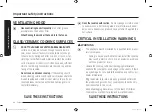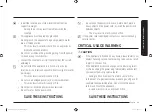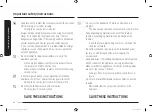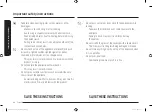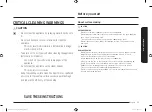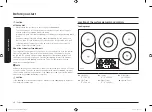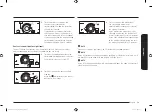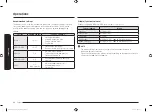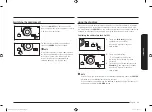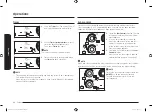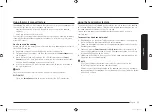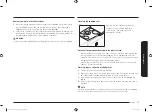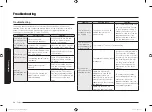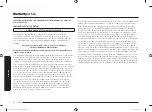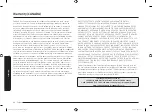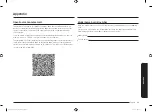
24
English
Operations
Operations
Choosing the proper cookware
What your cookware is made of determines how evenly and quickly heat is
transferred from the surface element to the pan bottom.
•
ALUMINUM
- Excellent heat conductor. Some types of food will cause the
aluminum to darken. (Anodized aluminum cookware resists staining & pitting.).
If aluminum pans are slid across the ceramic cooktop, they may leave metal
marks that resemble scratches. Remove these marks as soon as the cooktop
cools down.
•
COPPER
- Excellent heat conductor but discolors easily. May leave metal marks
on ceramic glass (To remove, see above.)
•
STAINLESS STEEL
- Slow heat conductor with uneven cooking results. Is
durable, easy to clean, and resists staining.
•
CAST IRON
- A poor conductor; retains heat very well. Cooks evenly once
cooking temperature is reached. Not recommended for use on ceramic
cooktops.
•
ENAMELWARE
- Heating characteristics will vary depending on the base
material. Porcelain enamel coating must be smooth to avoid scratching ceramic
cooktops.
•
GLASS
- Slow heat conductor. Not recommended for ceramic cooktop surfaces
because it may scratch the surface.
Protecting the cooktop
Cleaning
• Clean the cooktop before using it for the first time.
• Clean your cooktop daily or after each use. This will keep your cooktop looking
good and can prevent damage.
• If a spillover occurs while you are cooking, immediately clean the spill from
the cooking area while it is hot to prevent a tough cleaning chore later. Using
extreme care, wipe the spill with a clean, dry towel.
• Do not allow spills to remain on the cooking area or the cooktop trim for a
long period of time.
•
Do not
use abrasive cleansing powders or scouring pads which will scratch the
cooktop.
•
Do not
use chlorine bleach, ammonia, or other cleansers not specifically
recommended for use on a glass-ceramic surface.
Preventing marks and scratches
• Do not use glass cookware. It may scratch the cooktop.
•
Do not
place a trivet or wok ring between the cooktop and the pan. These
items can mark or scratch the cooktop.
• Make sure the cooktop and the pan bottom are clean.
•
Do not
slide metal pans across the cooktop.
Preventing stains
•
Do not
use a soiled dish cloth or sponge to clean the cooktop surface. A film
will remain, which may cause stains on the cooking surface after the area is
heated.
• Continuously cooking on a soiled surface can result in a permanent stain.
Preventing other damage
• Do not allow plastic, sugar, or foods with high sugar content to melt onto the
hot cooktop. Should this happen, clean immediately.
• Do not let a pan boil dry as this will damage the cooktop and the pan.
•
Do not
use the cooktop as a work surface or cutting board.
•
Do not
cook food directly on the cooktop. Always use the proper cookware.
NZ30K7570R_DG68-00821B-04_EN+MES+CFR.indb 24
2018-03-09 12:04:17
Summary of Contents for NZ30K7570RS
Page 34: ...Memo NZ30K7570R_DG68 00821B 04_EN MES CFR indb 34 2018 03 09 12 04 18 ...
Page 35: ...Memo NZ30K7570R_DG68 00821B 04_EN MES CFR indb 35 2018 03 09 12 04 18 ...
Page 70: ...Notas NZ30K7570R_DG68 00821B 04_EN MES CFR indb 34 2018 03 09 12 04 27 ...
Page 71: ...Notas NZ30K7570R_DG68 00821B 04_EN MES CFR indb 35 2018 03 09 12 04 27 ...
Page 106: ...Notes NZ30K7570R_DG68 00821B 04_EN MES CFR indb 34 2018 03 09 12 04 35 ...
Page 107: ...Notes NZ30K7570R_DG68 00821B 04_EN MES CFR indb 35 2018 03 09 12 04 35 ...

